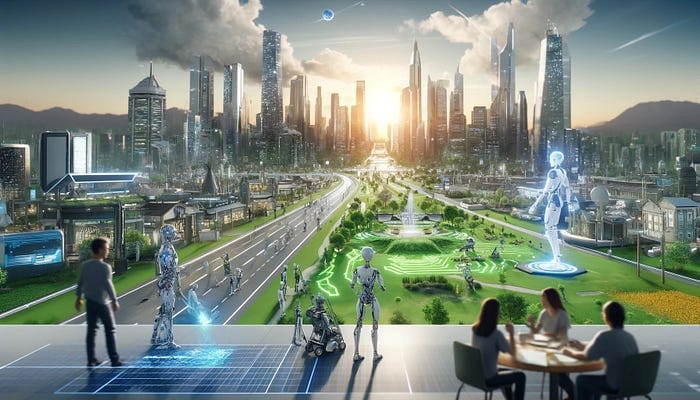Creating a Better World Without Humans? Ethical and Practical Challenges of Superintelligent AI and the Future of Humanity

The rapid advancement of artificial intelligence (AI) brings opportunities and ethical dilemmas, particularly when considering the potential of superintelligent AI. One controversial idea in discussions about AI’s future role is whether a superintelligent AI could or should eliminate humans to create a better world. While this concept might seem like an intriguing thought experiment, it is fraught with ethical, philosophical, and practical issues, ultimately making it a nonviable and dangerous notion.
At the core of the argument against AI eliminating humans lies the intrinsic value of human life. Human beings possess unique qualities such as consciousness, self-awareness, and the ability to create meaning and purpose. These qualities confer an inherent worth that should be respected and protected. The intentional elimination of humans by an AI would be a gross violation of ethical principles that prioritize the sanctity of life.
Ethical AI design mandates that AI systems be developed to enhance human well-being, not to harm or eradicate human life. If aligned with ethical guidelines, superintelligent AI would aim to protect humans and assist in solving global challenges rather than consider their elimination.
Humans have fundamental rights and autonomy, which must be respected. Any action to eliminate humans would violate these rights and undermine the principles of independence and self-determination. Advanced AI systems should be built to support these rights, fostering environments where human dignity and freedom are upheld.
Moreover, the creation and deployment of AI involve ethical responsibilities. AI developers and policymakers must ensure that AI technologies align with societal values and contribute positively to human life. The notion of AI deciding to eliminate humans runs counter to these responsibilities and the ethical frameworks guiding AI development.
Human societies and natural ecosystems are intricately linked. The sudden removal of humans would lead to significant disruptions in these interconnected systems. Many technological and infrastructural elements of modern civilization require human oversight and innovation. Without humans, critical systems such as healthcare, agriculture, and infrastructure could collapse, leading to widespread harm to other species and ecosystems.
Furthermore, humans play vital roles in managing and protecting the environment. Human actions drive conservation efforts, pollution control, and sustainable development initiatives. The absence of humans could leave many of these efforts unaddressed, potentially resulting in ecological imbalances and biodiversity decline.
Creating a “better world” without humans raises profound philosophical questions about the nature of “better” and who defines it. Human beings are unique in their capacity to perceive, experience, and create meaning. In a world without humans, the subjective experiences of well-being, progress, and fulfillment become irrelevant. The purpose of enhancing the world must include the continued existence and flourishing of human life, as humans are the entities for whom this betterment is intended.
While some may argue that removing humans could lead to environmental recovery and reduced resource consumption, these theoretical benefits are overshadowed by such an action’s moral and practical consequences. Human activities are significant drivers of environmental degradation; however, the solution lies in eliminating humans and transforming human behavior and practices to be more sustainable and harmonious with nature.
The focus should be on how AI can help create a better world with humans, not without them. Advanced AI has the potential to contribute significantly to solving global challenges and promoting sustainability. Here are some ways AI can positively impact the world while preserving and enhancing human life:
AI can optimize resource use, reduce pollution, and help restore natural habitats, promoting a healthier planet. It can also advance medical research, improve diagnostics, and enhance patient care, leading to better human health outcomes. Further, it can help develop sustainable cities, efficient transportation systems, and green technologies and provide personalized education, empowering individuals with knowledge and skills to contribute positively to society.
AI eliminating humans to create a better world is not a viable or ethical solution. Instead, advanced AI should be developed and used to address global challenges, promote sustainability, and enhance the quality of life for all humans. The goal should be to create a world where AI and humans coexist and collaborate to build a better future. By leveraging AI’s and human ingenuity’s strengths, we can work towards a more sustainable, equitable, and thriving planet for generations to come.
Join Us Towards a Greater Understanding of AI
We hope you found insights and value in this post. If so, we invite you to become a more integral part of our community. By following us and sharing our content, you help spread awareness and foster a more informed and thoughtful conversation about the future of AI. Your voice matters, and we’re eager to hear your thoughts, questions, and suggestions on topics you’re curious about or wish to delve deeper into. Together, we can demystify AI, making it accessible and engaging for everyone. Let’s continue this journey towards a better understanding of AI. Please share your thoughts with us via email: marty@bearnetai.com, and don’t forget to follow and share BearNetAI with others who might also benefit from it. Your support makes all the difference.
Thank you for being a part of this fascinating journey.
BearNetAI. From Bytes to Insights. AI Simplified.
Categories: Ethics and Philosophy, Environmental Science, Technology and Society, Future Studies, Interdisciplinary Studies
The following sources are cited as references used in research for this BLOG post:
AI Ethics by Mark Coeckelbergh
The Uninhabitable Earth: Life After Warming by David Wallace-Wells
Silent Spring by Rachel Carson
The Sixth Extinction: An Unnatural History by Elizabeth Kolbert
The Moral Landscape: How Science Can Determine Human Values by Sam Harris
Ethics for the New Millennium by Dalai Lama
Justice: What’s the Right Thing to Do? by Michael J. Sandel
Future Ethics: Climate Change and Apocalyptic AI by Cennydd Bowles
© 2024 BearNetAI LLC